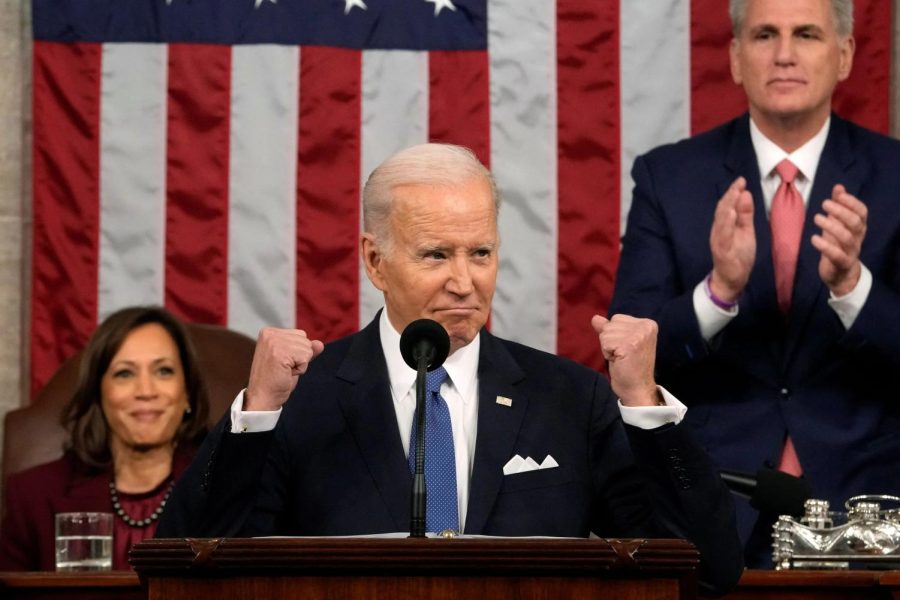State of the Union Protests Have Lost Their Efficacy
President Joe Biden spoke to the nation in his State of the Union address Feb. 7.
Last week, Representative Mary Miller, a Republican from Illinois, announced in an interview with Breitbart that she would not be attending President Biden’s State of the Union speech. She told Breitbart, “I do not plan to show up to and listen to him continue to lie.” Rep. Miller claims that Biden has lied about the security of the southern border and energy prices. While Rep. Miller was not in attendance at the event, she invited Mark A. Hurley — a veteran who left the military after refusing to take the COVID-19 vaccine as per military vaccine mandates — to attend in her place.
The Trump presidency brought an intensification of political polarization across the nation. Legislators who boycott the State of the Union today expect no change to come from their actions. Rather, motivations for boycotts frequently consist of rhetorical appeals and partisan politics, and the act of boycotting has turned into a show put on to please increasingly polarized constituencies. It stands as evidence of the political polarization that grips Congress and America as a whole.
Early boycotters of the State of the Union had solid reasons for their absence. The Congressional Black Caucus met with Nixon as a result of their boycott, and their act of protest saw some measure of success. In 1999, despite the partisan nature of the boycotts, there was a sense of bipartisan respect. The Republican chairman of the House Judiciary Committee, Rep. Hyde, said that he could not attend solely due to his old age. In making a statement to clarify his reasons, he showed respect for Clinton. In 2012, several dozen lawmakers of different parties sat together at the State of the Union in a show of bipartisanship that would be unthinkable today.
Boycotting the State of the Union is a form of political protest that has precedent going back to the 1970s. In 1971, twelve Black members of Congress boycotted President Nixon’s State of the Union. Later that year, they would officially form the Congressional Black Caucus. Nixon had repeatedly denied meetings to discuss policy with the group, so the caucus wrote an open letter announcing that it would not attend the State of the Union that year. The boycott received a lot of media attention, as it was the first organized boycott by members of the House. Nixon granted the group a meeting, where it presented 61 policy measures that would further equality for all Americans. The CBC’s protest was intentional and effective with solid goals that it was able to realize.
There were no other political boycotts of the State of the Union until 1999, when Republicans boycotted President Clinton’s State of the Union. Clinton had been impeached by the House and was currently on trial in the Senate. The Republican members who took part in the boycott thought that Clinton should have waited until the trial proceedings were over to give his speech. Two Republicans explained in a letter to Republican colleagues that they found the President to be demonstrating disrespect for Congress by continuing with his address.
Thirteen years later, in 2012, Republican Representative Doug Lamborn boycotted President Obama’s State of the Union address. Lamborn believed that Obama would be in campaign mode and bash political opponents. The Congressman also stated that he did not support Obama’s policies. This boycott received less attention than the two that had preceded it. While there is a consistent influence of partisan politics on boycotts of the State of the Union, Lamborn’s actions seem more partisan than previously. In the cases of Nixon and Clinton’s State of the Union, dissidents had reasons beyond disagreeing with policy.
After Lamborn’s boycott, instances of lawmakers boycotting the State of the Union became more frequent. In 2018, democratic lawmakers boycotted to protest comments President Trump made, as well as his travel ban. In 2020, democratic lawmakers protested Trump again, this time led by Alexandria Ocasio-Cortez and “the squad”, a group of progressive democratic lawmakers. Cortez took to Twitter, telling Americans that she did not want to legitimize the Trump administration. In 2022, a group of Republican lawmakers protested President Biden’s State of the Union. At the 2022 State of the Union, attendees were required to present a negative COVID-19 test to enter. Senator Marco Rubio did not want to present a COVID-19 test, which he cited as a reason for boycotting.
In the modern era, technology allows the President to make their case in every American house with a television. The State of the Union address has transformed from a letter to Congress to a very political opportunity to campaign for support for the President’s administration. There are members of Congress who do not support their current administration and take this event as an opportunity for that to be known. In 1971, the Congressional Black Caucus wrote in the open letter announcing their boycott. “Our people are no longer asking for equality as a rhetorical promise.” Today, similar acts of political protest are increasingly nothing but empty displays of partisanship.


